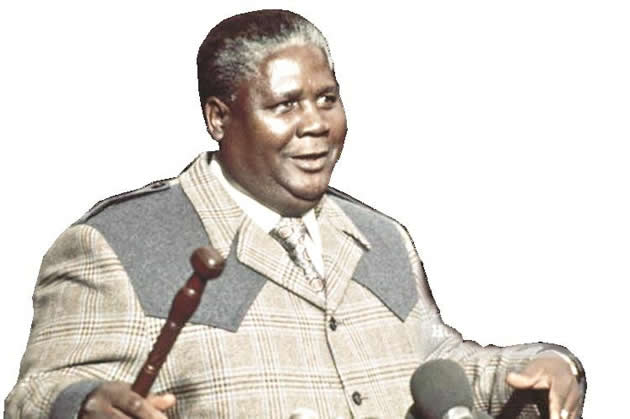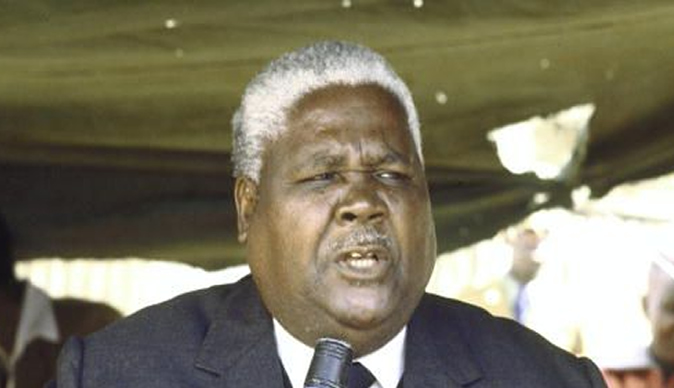Nkomo: Visionary leader, unifier and father figure

 Yoliswa Dube Features Reporter
Yoliswa Dube Features Reporter
ON July 1, 1999, a dark cloud hung over Zimbabwe after Umdala Wethu, Father Zimbabwe, Chibwechitedza — the late nationalist and Vice-President Dr Joshua Mqabuko Nkomo breathed his last.
He succumbed to prostate cancer at 82 years of age.
Dr Nkomo, whose life was dedicated to the people of Zimbabwe, will always be remembered for his sacrifices and contributions for the betterment of the greater population.
While for most Zimbabweans the loss of such a visionary leader, unifier and father figure was huge, its gravity is greatly felt, even to this day by those with whom he shared personal relationships — his friends, family, fellow nationalists, other personal associates and perhaps even foes who knew Dr Nkomo personally.
Although departed, Dr Nkomo remains an inspiration to many and his legacy will remain embedded in the minds of both old and young generations whose lives he directly and indirectly gladdened.
Father Zimbabwe was courageous and simply refused to regard the hardships and strenuous challenges he faced as retardants, but was always ready to be a sacrifice when it came to issues regarding Zimbabwe.
The late Father Zimbabwe was born on June 19, 1917 in the then Semukwe Reserve in Matabeleland South province.
His father, Thomas Nyongolo Letswana Nkomo, was a community leader and preacher for the London Missionary Society.
After completing his primary school education, the late Vice-President took a carpentry course at the Tsholotsho Government Industrial School. He studied there for a year and later became a driver.
Shortly after that, he worked as a teacher, specialising in carpentry at Manyame School in Kezi.
In 1942, he left the country to further his education in South Africa where he attended Adams College and Jan Hofmeyer School of Social Work.
It was while he was studying in South Africa that Dr Nkomo met the icon of South Africa’s liberation struggle, Nelson Mandela and other nationalists of African liberation, most of whom were studying at Fort Hare University.
The contacts he had with fellow nationalists provided the foundation for his future political career. He graduated with a Bachelor of Arts Degree in Social Work.
After returning to Bulawayo in 1948 armed with his degree, he got a job at the Rhodesia Railways (now National Railways of Zimbabwe) as a social worker, becoming the first African to be appointed to the position that was regarded as prestigious for blacks then. He then studied for a Bachelor of Arts Degree in Economics and Sociology with the University of South Africa (Unisa).
As a trade unionist, Dr Nkomo was a leading figure in the 1948 general strike by blacks, which grounded commerce and industry in the country.
He married Johanna Fuyana on October 1, 1949.
Three years later, he became leader of the African National Congress of Rhodesia. But the minority white regime of the day banned ANC.
The banning of the party did not extinguish his nationalism and that of his peers as in 1960, at the formation of the National Democratic Party (NDP); he was elected its president.
Like its predecessor, the NDP was banned.
In 1962, Dr Nkomo and other political figures formed the Zimbabwe African People’s Union (Zapu). Again Zapu was banned on September 20, 1962.
Frustrated with the suppression of political expression in the country, Dr Nkomo decided to form a government in exile. However, the move did not go down well with his fellow comrades.
Zapu split in 1963 and Zimbabwe African National Union (Zanu) was formed.
On April 16, 1964, Dr Nkomo was arrested, detained and spent the next 10 years at the notorious Gonakudzingwa detention camp, in the inhospitable, malarial southeastern Lowveld.
On his release in 1974, Dr Nkomo left the country to lead the armed liberation war, using Zambia as the base of the Zimbabwe People’s Revolutionary Army, which he led as its commander-in-chief.
His efforts and those of the people he commanded and the Zimbabwe African National Liberation Army (Zanla) defeated the Rhodesian army of Ian Smith, forcing the recalcitrant minority leader to the negotiating table.
A series of talks followed at Malta, Geneva and Lancaster and the attainment of Independence on April 18, 1980. Prior to Independence, Dr Nkomo had led his party, Zapu to the country’s first democratic election, and came second after Zanu.
He became the country’s first Minister of Home Affairs.
On December 22, 1987, he, together with Cde Mugabe, signed the Unity Accord that ended civil disturbances in Matabeleland and parts of Midlands and took up the post of Vice-President of the country.
He championed unity, peace and national development in that capacity for 12 years until he passed on July 1, 1999. This year marks the 15th anniversary of his passing.










Comments